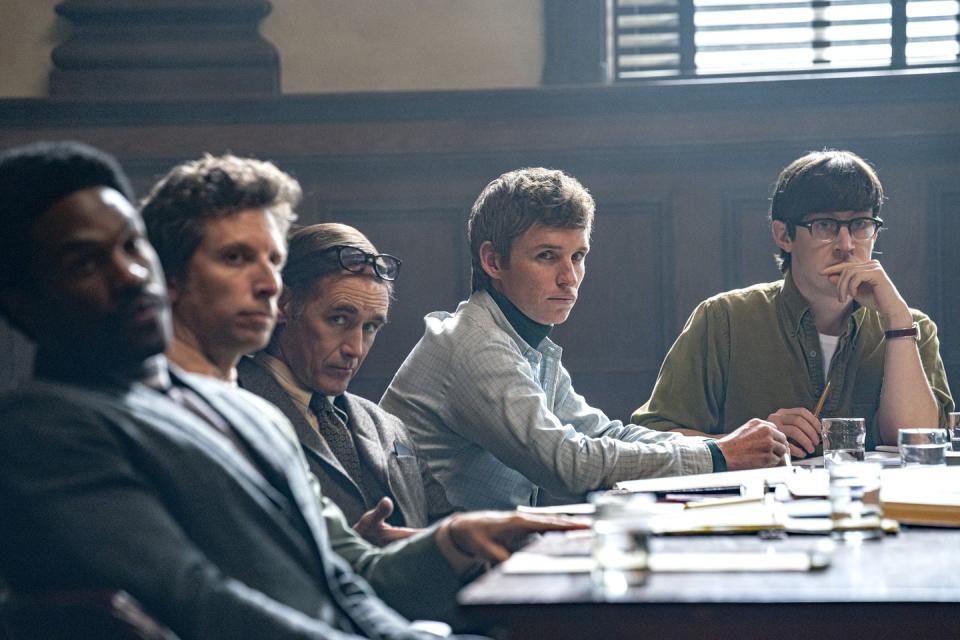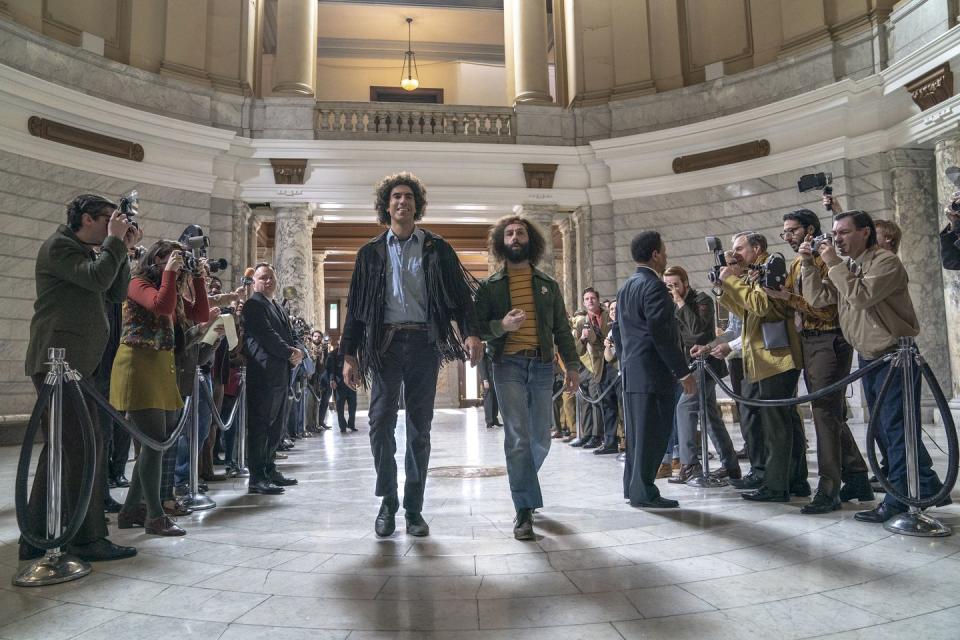Aaron Sorkin's 'The Trial of the Chicago 7' Review: A Timely Reminder of Protest's Power

Aaron Sorkin's new film about the trial of the Chicago Seven has been gestating for more than a decade, and filming wrapped before this summer of protest. But between its depictions of police brutality, its marchers in the streets, its institutions unwilling to confront their own biases, and its portrayal of a state happy to ignore facts and evidence that prove inconvenient to its arguments, The Trial of the Chicago 7 could hardly be more timely.
A courtroom thriller, it tells the true story of how, in 1969, Vietnam War draft protestors Tom Hayden (Eddie Redmayne), Rennie Davis (Alex Sharp), Abbie Hoffman (Sacha Baron Cohen), Jerry Rubin (Jeremy Strong), Lee Weiner (Noah Robbins), John Froines (Daniel Flaherty) and David Dellinger (John Carroll Lynch) were tried for conspiracy and inciting a riot at the 1968 Democratic National Convention, despite flimsy evidence.
They're not much of a gang, despite what the state says. Hayden and Davis are clean-cut college organisers, Hoffman and Rubin countercultural revolutionaries leading the Youth International Party, known as the Yippies. The others are odds and ends, acquaintances and strangers from the broader Civil Rights struggle. But the state has decided they're a gang, and that they deserve 10 years in jail.
Black Panthers co-founder Bobby Seale (Yahya Abdul-Mateen II), the eighth defendant, was cut out of the trial partway through, though not before being shackled and gagged in the courtroom. Mark Rylance's haggard but steely William Kunstler is their lawyer, butting heads with Judge Julius Hoffman (a particularly excellent Frank Langella), who puts roadblock after roadblock in the way of a fair trial.

As you'd expect of a Sorkin script, it crackles and fizzes, particularly in a cross-cutting walk-and-talk-and-talk-and-talk sequence, which might be the most Aaron Sorkin part of any Aaron Sorkin project ever. Baron Cohen and Strong, in particular, make the most of their brotherly stoner double-act, and it's easy to see why Baron Cohen would have jumped at the part; his Hoffman walks the same line of acid mockery and genuine insurrection as his best characters have, and gives him a chance to flip between charismatic sermonising, political stand-up and pointed gravitas.
As much as the film is about the cruelties and vagaries of a justice system and political machine being used to crush dissent, it's perhaps more about painful internecine squabbling between groups on the left. What starts as the youth versus the establishment quickly descends into the youth versus itself.
Hayden and Davis, the white-bread middle-class college boys, are about taking power by winning elections. They find Hoffman and Rubin's pie-in-the-sky plans about levitating the Pentagon and covering Chicago in banana skins alternately ludicrous and infuriating, self-centred irritants rather than committed change-makers. In return, Hoffman and Rubin see them as complacent and dull, unable – or unwilling – to imagine a future without a system. For Hayden the trial is just that, a fight to avoid jail; for Hoffman and Rubin it's a soapbox. You get the sense that Sorkin leans toward Hayden's pragmatism, though the film itself stays pretty equivocal.
"You're trading a cow for magic beans," Hayden snaps at Hoffman at one point.
"Actually, that ended up working," Rubin points out.

It all swirls together neatly. Slick, sprightly and densely packed with ideas, the clashing personalities among the defendants are never less than entertaining, and you're never more than a few minutes away from some sharply turned verbal sparring. In other words, this is a Sorkin movie, full of sparring idealists who always have a zinger in their back pocket.
The counter to that being: this a Sorkin movie, and the style can't always paper over a lack of substance. Partly that's because history doesn't always provide the beats that make for compelling cinema. The sudden disappearance of the Black Panthers and Seale – up to that point, the film's most incendiary and mistreated figure – leaves a yawning hole at its centre that his fellow defendants can't quite fill. The climax of the trial, though stirring, felt less satisfying the longer I sat with it. You're left thinking: so... does the system work, actually? Or is the system only broken until the point that it releases you? Is the system the problem, or the people using it? The film's central question, of whether seeking the respect of the people and institutions you intend to destroy is sensible or absurd, remains unanswered.
The enduring moment of Sorkin's last legal drama, A Few Good Men, saw Jack Nicholson screaming that Tom Cruise – and we, the audience – couldn't handle the truth. Baron Cohen gets a comparable moment here: pressed for an answer on the stand, he tells the prosecutor: "Give me a moment, would you friend? I've never been on trial for my thoughts before."
In The Trial of the Chicago 7 it's not that we can't handle the truth; it's that the truth is whatever the person with power allows to be said. That might be an even scarier thought.
The Trial of the Chicago 7 is in cinemas from 2 October and on Netflix from 16 October
Like this article? Sign up to our newsletter to get more delivered straight to your inbox
Need some positivity right now? Subscribe to Esquire now for a hit of style, fitness, culture and advice from the experts
You Might Also Like

 Yahoo News
Yahoo News 